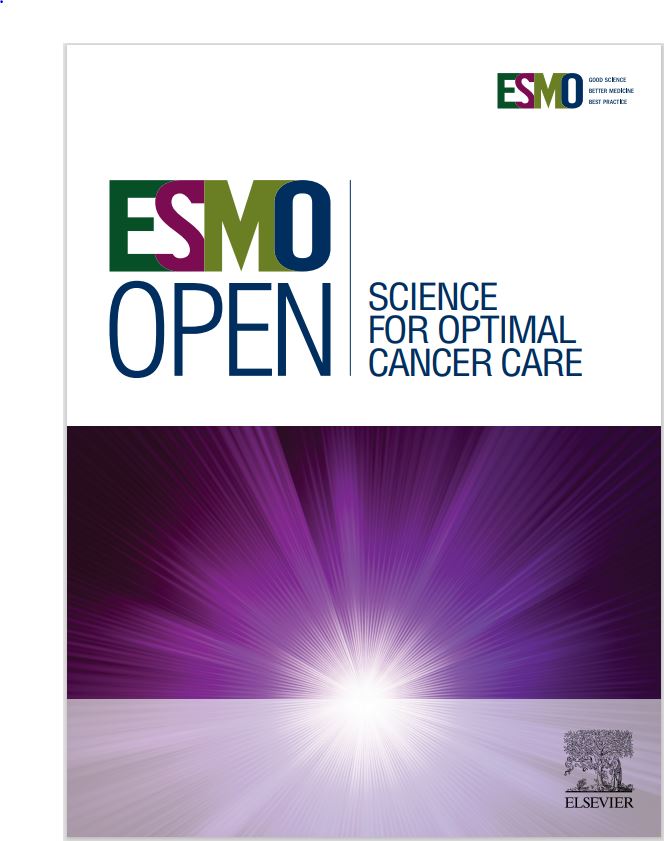Quality-adjusted survival in patients with metastatic colorectal cancer treated with fruquintinib plus best supportive care: results from FRESCO-2
IF 7.1
2区 医学
Q1 ONCOLOGY
引用次数: 0
Abstract
Background
Treatment toxicity and disease-related symptoms of metastatic colorectal cancer (mCRC) can adversely affect quality of life (QoL). Maintaining QoL is an important treatment goal alongside improving survival outcomes. Quality-adjusted time without symptoms of disease or toxicity (Q-TWiST) measures the quality of patients’ survival by assessing the proportion of survival time that is free of symptoms/toxicity. The phase III FRESCO-2 study met its primary endpoint, demonstrating improved overall survival with fruquintinib plus best supportive care (BSC) versus placebo plus BSC [hazard ratio 0.66, 95% confidence interval (CI) 0.55-0.80, P < 0.001]. This post hoc Q-TWiST analysis compared the benefit–risk of fruquintinib versus placebo in all patients randomized in FRESCO-2.
Methods
Patients with refractory mCRC in the USA, Europe, Japan, and Australia were randomized to receive fruquintinib (n = 461) or placebo (n = 230) plus BSC until disease progression or unacceptable toxicity. Patients’ survival time was partitioned as follows: time from randomization with grade 3/4 treatment-emergent adverse events (TEAEs) before progression (TOX); time from randomization to progression without grade 3/4 TEAEs (TWiST); and time from progression to death/censoring (REL). Q-TWiST was calculated as the combined utility-weighted mean durations of each health state, assuming utility coefficients of 1 for TWiST and 0.5 for TOX and REL.
Results
Q-TWiST was improved when fruquintinib (versus placebo) was added to BSC, with a between-treatment difference of 2.0 months (95% CI 1.5-2.6 months, P < 0.05) and a relative improvement of 31.4%. This effect was primarily driven by the difference in the TWiST component [mean difference 2.1 months (95% CI 1.8-2.5 months), P < 0.05]. Q-TWiST improvements were consistent in all subgroups, including by age, sex, liver metastases, and primary tumor site. The subgroup and sensitivity analysis results confirmed the robustness of the primary analysis findings.
Conclusions
Fruquintinib provides a clinically meaningful quality-adjusted survival benefit versus placebo in refractory mCRC.

求助全文
约1分钟内获得全文
求助全文
来源期刊

ESMO Open
Medicine-Oncology
CiteScore
11.70
自引率
2.70%
发文量
255
审稿时长
10 weeks
期刊介绍:
ESMO Open is the online-only, open access journal of the European Society for Medical Oncology (ESMO). It is a peer-reviewed publication dedicated to sharing high-quality medical research and educational materials from various fields of oncology. The journal specifically focuses on showcasing innovative clinical and translational cancer research.
ESMO Open aims to publish a wide range of research articles covering all aspects of oncology, including experimental studies, translational research, diagnostic advancements, and therapeutic approaches. The content of the journal includes original research articles, insightful reviews, thought-provoking editorials, and correspondence. Moreover, the journal warmly welcomes the submission of phase I trials and meta-analyses. It also showcases reviews from significant ESMO conferences and meetings, as well as publishes important position statements on behalf of ESMO.
Overall, ESMO Open offers a platform for scientists, clinicians, and researchers in the field of oncology to share their valuable insights and contribute to advancing the understanding and treatment of cancer. The journal serves as a source of up-to-date information and fosters collaboration within the oncology community.
 求助内容:
求助内容: 应助结果提醒方式:
应助结果提醒方式:


